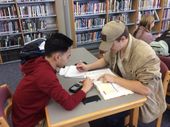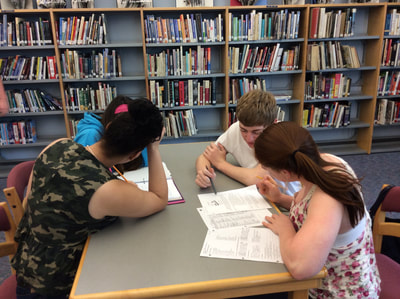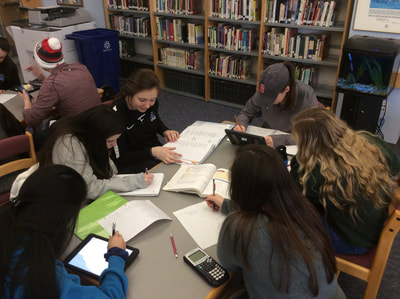and received a 2017 President's Award.
 One on one tutoring in the AHS Library
One on one tutoring in the AHS Library I am the librarian and National Honor Society (NHS) co-adviser at Auburn High School (AHS). As co-adviser to the NHS students for the past 10 years, I have received many requests for tutoring support. For years, tutoring was only considered to be an after school thing, which often conflicted with the availability of the NHS students. Usually the NHS students are the ones who are overbooked with activities, sports, and work, so, in reality, tutoring did not happen often. Additionally, it has only been within the past four years or so that AHS offers the daily 30 minute directed-study, which is critical to the success of the program.
What started out as my Professional Goal a few years ago has turned into a staple for the AHS students. Four years ago, I asked the NHS members if they would tutor during the directed-study period. This was purely optional, and still is to this day. The NHS students receive volunteer credit, and the students who wanted help would receive the extra support. That first year, we had a total of 75 partnerships. In my eyes, the program was a success from the start, and it has just grown from there. This school year, during the first trimester, we had 42 tutoring partnerships. (AHS is on a trimester schedule, so I track student usage of tutoring services by trimester.) The program is growing!
So, how does the program work? Students who are looking for some extra support can either come directly to me to request a tutor or go through either their teacher or guidance counselor, who will then notify me. The student is paired with an NHS student who has a strength in the subject area. (Most NHS students are capable of tutoring in most subjects. The requests for help are often math or science-based, at the basic, college-prep levels.) The two students then agree upon two days to meet during our directed-study period over the course of a school week. This partnership remains intact until the student who sought help no longer needs or wants it. At the start of the partnership, the NHS student meets briefly with the teacher in the academic area in which the student is struggling, to gain a better insight as to how to help the student. It is required that the student who requested a tutor brings relevant materials to each tutoring session. Both students are also asked to stay focused and on topic for the period (I never have problems with this). I monitor the partnerships, and keep a Google spreadsheet (which I share with the faculty) to track who is being tutored in which subject, when they are supposed to meet, and who the content teacher and guidance counselors are. For the most part, things work smoothly. Class meetings, band practices and other miscellaneous gatherings may prohibit students from meeting, but that occurs on a very limited basis. In some cases, I will have repeated requests for a particular subject, so instead of one-to-one tutoring, I have formed groups (we call them clubs). When this occurs, there are two or three tutors working with the group/club at any given time.
I could not do any of this without the help of the NHS students. They are the backbone of this program. When asked, approximately half of the membership agreed to tutor. If the NHS tutor shows up and the student that they are suppose to tutor does not show, the NHS member still receives credit (30 minutes) for being available to tutor. The super tutors (the ones who are here every day and put in a great effort) are acknowledged at our yearly induction ceremony.
The program has changed over the course of the last three years. It originally began as a strict one-to-one program. With the increase in requests, though, I have tried to encourage the group tutoring instead of individual tutoring, but I am having mixed reviews. Some students just do better with the individual attention, while others benefit from being in a small group.
The following I consider “bumps in the road.” Occasionally, students do not show up (either to tutor or to be tutored), so I usually try to track these students down. Sometimes kids forget, sometimes they are absent, and sometimes they just need the extra push to come and get some support.
Also, lately there has been a great increase in tutoring requests. I know this should be a positive, but with a limited number of tutors, it can sometimes be difficult to handle everyone’s needs. To help combat the issue, it is required that students who desire extra support in a specific area stay with that content teacher when the directed-study block is linked to that specific class. Moreover, some students who seek help will still fail the course. Just because a student is coming for extra help does not translate into a passing grade. (I spend time talking with the NHS membership about this so they are not discouraged if one of their tutees still fails a course). Finally, tutoring occurs in the media center, which is open to the student body during directed-study, so on certain days I am packed to the gills with kids, which increases the noise and decreases the surety level that everyone is staying on task.
For successes, the number of students who are seeking help is wonderful. Most of them seem comfortable enough to receive help from a peer that they may not even know. Many students’ grades have risen, especially for those who have stuck with the program. Last year our “chemistry club” tutors were so excited that all of their “students” passed chemistry! New friendships have been forged, and some tutors have shared the fact that they just feel good helping someone else.
Overall, I consider the program a success. It has brought students together and filled a gap in our student services program. Please feel free to contact me if you have any questions about the program.



